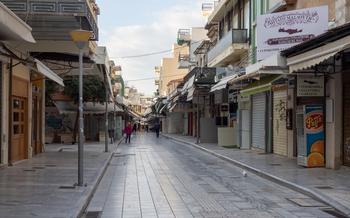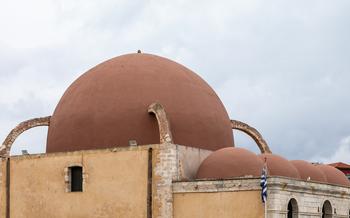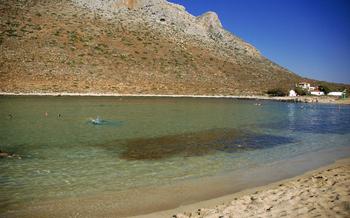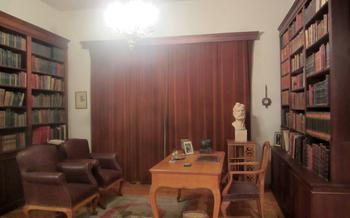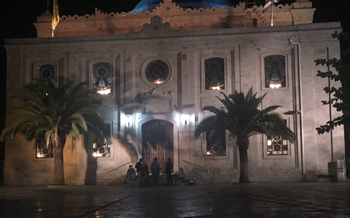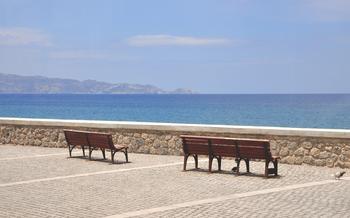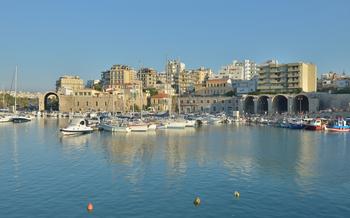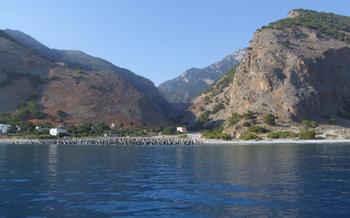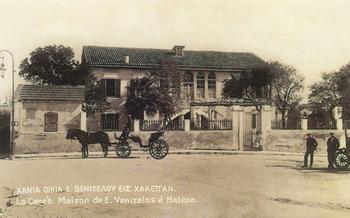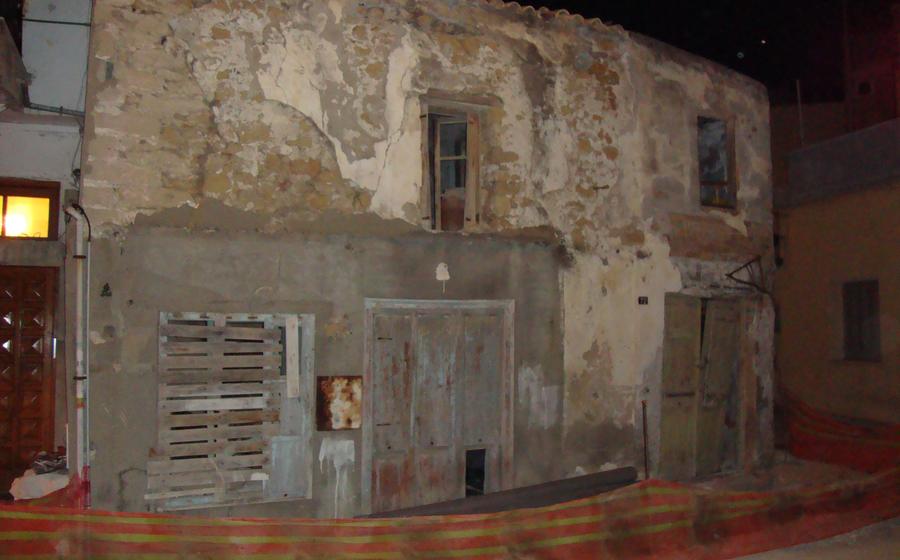
Nikos Kazantzakis Museum
- Exploring the Museum's Exhibits: A Multisensory Experience
- Kazantzakis's Literary Masterpieces: A Glimpse into His Creative Genius
- The Man Behind the Words: Kazantzakis's Personal Journey
- Heraklion's Connection to Kazantzakis: A City Steeped in History
- A Stroll Through Kazantzakis's Neighborhood: Following in His Footsteps
- Kazantzakis's Tomb: A Place of Reflection and Remembrance
- Literary Events and Festivals: Celebrating Kazantzakis's Legacy
- Kazantzakis in Popular Culture: Beyond the Written Word
- The Kazantzakis Research Center: A Hub for Scholarship
- Educational Programs and Workshops: Engaging with Kazantzakis's Work
- Volunteering Opportunities: Contributing to Kazantzakis's Legacy
- Accessibility and Facilities: Ensuring an Inclusive Experience
- Insider Tip: Exploring Kazantzakis's Footsteps Beyond Heraklion
Exploring the Museum's Exhibits: A Multisensory Experience
Step into the world of Nikos Kazantzakis through the museum's captivating exhibits, designed to offer a multisensory experience that brings his life and work to life. Delve into his personal belongings, including handwritten manuscripts, letters, and photographs, which offer intimate glimpses into his creative process and daily life. Interactive displays and multimedia presentations engage visitors of all ages, providing a dynamic and immersive journey through Kazantzakis's literary and philosophical universe.
The museum's thematic sections showcase different aspects of Kazantzakis's life and work, allowing visitors to explore his diverse literary output and philosophical inquiries. Discover the inspiration behind his most celebrated novels, including the iconic "Zorba the Greek," and gain insights into his travels, personal struggles, and philosophical quest for meaning. Temporary exhibitions and special events further enrich the museum experience, offering fresh perspectives on Kazantzakis's work and its enduring relevance.
Kazantzakis's Literary Masterpieces: A Glimpse into His Creative Genius
Nikos Kazantzakis's literary legacy extends far beyond the shores of Greece, captivating readers worldwide with his profound insights into the human condition. Among his most celebrated works, "Zorba the Greek" stands as a masterpiece of modern literature. Published in 1946, the novel delves into the complexities of human nature and the search for meaning in life through the eyes of a young intellectual and his encounter with the enigmatic figure of Zorba, a free-spirited and passionate Greek peasant.
"Zorba the Greek" has been translated into more than 50 languages and adapted into several films, including the acclaimed 1964 movie starring Anthony Quinn. Its universal themes of friendship, love, and the pursuit of happiness have resonated with readers across cultures, solidifying Kazantzakis's status as a literary giant.
Other notable works by Kazantzakis include "The Last Temptation of Christ," a daring exploration of the internal struggles and human desires of Jesus Christ, and "Freedom or Death," an epic historical novel set during the Greek War of Independence. These works showcase Kazantzakis's unique writing style, characterized by its lyrical prose, philosophical depth, and unwavering commitment to exploring the big questions of existence.
Kazantzakis's works have garnered international recognition and acclaim, earning him numerous awards and accolades. He was nominated for the Nobel Prize in Literature on several occasions and remains one of the most widely read and celebrated Greek authors of all time. His writings continue to inspire and challenge readers, inviting them to embark on a journey of self-discovery and reflection on the human spirit.
The Man Behind the Words: Kazantzakis's Personal Journey
Nikos Kazantzakis was born in Heraklion, Crete, in 1883, and his early life was marked by the island's rich history and culture. His father, Michalis, was a prosperous merchant, and his mother, Maria, was a devout Christian. Kazantzakis's childhood home was a hub of intellectual and cultural activity, and he was exposed to a wide range of ideas and influences from an early age.
In 1902, Kazantzakis left Crete to study law at the University of Athens. However, he soon realized that his true passion lay in literature and philosophy. He abandoned his legal studies and traveled extensively throughout Europe, immersing himself in the intellectual and artistic currents of the time. His travels took him to France, Germany, Italy, and Russia, where he encountered a diverse range of thinkers and writers who would shape his own philosophical and literary development.
Kazantzakis's personal experiences and travels played a pivotal role in shaping his worldview. He witnessed the horrors of World War I firsthand, and he was deeply affected by the social and political upheavals of his time. These experiences led him to question traditional beliefs and values, and to search for new ways of understanding the human condition.
Throughout his life, Kazantzakis struggled with his own personal demons, including doubts about his faith, his search for meaning and purpose in life, and his desire for freedom and self-expression. These struggles are reflected in his writings, which often explore themes of existentialism, spirituality, and the search for truth.
Heraklion's Connection to Kazantzakis: A City Steeped in History
Heraklion, the capital of Crete, holds a deep and enduring connection to Nikos Kazantzakis, the renowned Greek writer and philosopher. It was here that Kazantzakis was born in 1883, and the city served as a backdrop for his early life and literary development. Heraklion's rich history, vibrant culture, and stunning landscapes left an indelible mark on Kazantzakis's imagination, inspiring many of his literary works.
The city's historical landmarks and cultural institutions are intertwined with Kazantzakis's life and work. The imposing Venetian walls that surround Heraklion's old town, with their grand gates and bastions, form a backdrop to some of Kazantzakis's most vivid descriptions of his childhood. The city's museums, churches, and libraries contain valuable artifacts and documents related to his life and writings.
Kazantzakis's birthplace, a modest house in the heart of Heraklion's old town, has been carefully preserved and transformed into a museum dedicated to his life and work. Visitors can explore the rooms where Kazantzakis spent his early years, gaining insights into his family life and the formative experiences that shaped his literary genius.
Heraklion's connection to Kazantzakis extends beyond its physical landmarks. The city's vibrant literary scene, with its bookstores, cafes, and cultural events, pays homage to the writer's legacy. His works are widely read and discussed, and his influence can be felt in the writings of contemporary Cretan authors.
Exploring Heraklion through the lens of Nikos Kazantzakis offers a unique and enriching experience. The city's streets, landmarks, and cultural institutions become living testimonies to the life and work of this literary giant, inviting visitors to delve deeper into his extraordinary world of words and ideas.
A Stroll Through Kazantzakis's Neighborhood: Following in His Footsteps
To fully immerse yourself in the life and works of Nikos Kazantzakis, embark on a walking tour of key locations related to his formative years in Heraklion. Begin at his childhood home, a charming traditional Cretan house where he spent his early years. Imagine the young Kazantzakis roaming the streets of his neighborhood, observing the people and landscapes that would later inspire his writing.
Continue your walk to his school, where he received his formal education and began to develop his passion for literature. Explore the streets and landmarks that served as the backdrop for his stories, and discover hidden gems and local anecdotes that shed light on his personal life and experiences.
Along the way, you'll encounter historical and cultural landmarks that played a significant role in Kazantzakis's life and work. Visit the Venetian walls that once encircled Heraklion, providing both protection and inspiration to the young writer. Admire the grandeur of the Cathedral of Saint Minas, a symbol of the city's rich religious heritage. Stroll through the lively market square, where Kazantzakis likely engaged with the local people and observed the vibrant tapestry of Cretan life.
As you follow in Kazantzakis's footsteps, you'll gain a deeper understanding of the man behind the words and the environment that shaped his literary genius. This immersive experience will bring his stories to life and provide a unique perspective on the places that held special meaning for the beloved Cretan writer.
Kazantzakis's Tomb: A Place of Reflection and Remembrance
At the end of a peaceful cypress-lined path, nestled amidst the tranquil scenery of Heraklion's municipal cemetery, lies the final resting place of Nikos Kazantzakis. His tomb, a striking architectural masterpiece, stands as a testament to the enduring legacy of this literary giant. Designed by renowned Greek architect Takis Zenetos, the tomb is a fusion of traditional Cretan elements and modern design. Its austere yet elegant form, adorned with symbolic motifs, reflects Kazantzakis's deep connection to his homeland and his philosophical beliefs.
The tomb, constructed from local stone and concrete, features a series of concentric circles that evoke a sense of eternity and the cyclical nature of life. The central chamber, where Kazantzakis's remains are laid to rest, is illuminated by a skylight that filters the Mediterranean sunlight, creating a serene and contemplative atmosphere. The surrounding walls bear inscriptions from Kazantzakis's own writings, chosen by his wife Helen, offering visitors a glimpse into his philosophical musings on life, death, and the pursuit of truth.
Visiting Kazantzakis's tomb is a poignant experience that allows visitors to pay homage to a literary icon and reflect on his remarkable life and work. The serene setting, coupled with the symbolic elements of the tomb's design, invites visitors to contemplate the profound impact of Kazantzakis's writings and his enduring legacy in the world of literature.
Literary Events and Festivals: Celebrating Kazantzakis's Legacy
Heraklion, the birthplace of Nikos Kazantzakis, not only boasts the Nikos Kazantzakis Museum but also serves as a vibrant hub for literary events and festivals dedicated to celebrating the author's enduring legacy. These events provide a platform for scholars, authors, and enthusiasts to come together and explore the depth and significance of Kazantzakis's work.
The annual Kazantzakis Festival, held in Heraklion during the summer months, is a highlight of the city's cultural calendar. The festival features a variety of events, including book readings, discussions, exhibitions, and performances inspired by Kazantzakis's writings. Attendees have the opportunity to engage with experts on Kazantzakis's life and work, delve into the themes and ideas that shaped his writing, and appreciate the diverse interpretations of his literary masterpieces.
Other notable events include the International Kazantzakis Symposium, which brings together scholars from around the world to present their research and insights on Kazantzakis's work, and the Kazantzakis Film Festival, which showcases film adaptations and documentaries related to the author's life and writings.
These literary events and festivals not only celebrate Kazantzakis's contributions to world literature but also provide a unique opportunity for visitors to immerse themselves in the vibrant literary scene of Heraklion, engage with fellow enthusiasts, and gain a deeper understanding of the author's enduring impact on the world of literature and thought.
Kazantzakis in Popular Culture: Beyond the Written Word
Nikos Kazantzakis's literary creations have transcended the boundaries of the written word, leaving an indelible mark on popular culture. His works have been adapted into numerous films, captivating audiences worldwide. "Zorba the Greek," based on the novel of the same name, remains a cinematic masterpiece, immortalizing Anthony Quinn's portrayal of the irrepressible Zorba. Kazantzakis's writings have also inspired theater productions and operas, bringing his characters and stories to life on stage. These adaptations have not only introduced Kazantzakis's work to a broader audience but have also ensured its continued relevance and impact.
Beyond adaptations, Kazantzakis's influence extends to contemporary literature and thought. His unique writing style, philosophical insights, and exploration of universal themes have resonated with readers and writers alike. His works have sparked intellectual discussions, inspired new creative endeavors, and contributed to the development of modern Greek literature. Kazantzakis's legacy lives on not only in the pages of his books but also in the diverse cultural expressions that draw inspiration from his literary genius.
The Kazantzakis Research Center: A Hub for Scholarship
Housed within the Nikos Kazantzakis Museum, the research center serves as a vital hub for scholars, researchers, and academics dedicated to studying the life and work of Nikos Kazantzakis. Established to preserve and promote his literary legacy, the center offers a wealth of resources and opportunities for those seeking to delve deeper into his writings and explore his impact on world literature.
The research center houses an extensive collection of Kazantzakis's personal papers, unpublished manuscripts, and correspondence, providing invaluable insights into his creative process and intellectual journey. Researchers have access to a comprehensive library specializing in Kazantzakis studies, featuring a vast collection of books, articles, and critical analyses. The center also collaborates with international institutions and scholars, facilitating research projects, conferences, and publications that further contribute to the understanding and appreciation of Kazantzakis's work.
Through its commitment to preserving and disseminating knowledge about Nikos Kazantzakis, the research center plays a crucial role in fostering academic discourse and promoting his literary legacy to future generations of scholars and enthusiasts. It serves as a vital resource for researchers seeking to explore the depths of Kazantzakis's writings, unlocking new perspectives and enriching our understanding of his contributions to world literature.
Educational Programs and Workshops: Engaging with Kazantzakis's Work
The Nikos Kazantzakis Museum offers a variety of educational programs and workshops designed to engage visitors of all ages with the life and work of the renowned author. These programs aim to promote literary appreciation, critical thinking, and a deeper understanding of Kazantzakis's writings.
School groups and university students can participate in guided tours tailored to their specific curriculum, exploring themes such as Kazantzakis's philosophical ideas, his literary techniques, and the historical context of his works. Interactive activities, hands-on experiences, and discussions encourage students to engage with the material in a meaningful way.
Public workshops and seminars are also regularly organized, inviting scholars, authors, and enthusiasts to delve into various aspects of Kazantzakis's life and work. These events provide a platform for in-depth discussions, critical analysis, and the exchange of ideas, fostering a vibrant literary community in Heraklion.
Through these educational initiatives, the museum strives to cultivate a love of literature, nurture critical reading skills, and inspire future generations to explore the timeless works of Nikos Kazantzakis.
Volunteering Opportunities: Contributing to Kazantzakis's Legacy
The Nikos Kazantzakis Museum offers a unique opportunity for visitors to actively contribute to the preservation and promotion of the author's legacy. Volunteering at the museum is a rewarding experience that allows individuals to get involved in various aspects of its operations and contribute their skills and knowledge to a meaningful cause.
There are several ways to get involved as a volunteer at the Nikos Kazantzakis Museum. One option is to become a museum guide, providing visitors with insights into Kazantzakis's life and work. Volunteers can also assist in organizing events, workshops, and educational programs, contributing to the museum's outreach and engagement with the community.
For those with a research background or a passion for literature, volunteering at the museum's research center can be a fulfilling experience. Volunteers can assist with research projects, cataloging and digitizing archival materials, and contributing to the museum's publications.
By volunteering at the Nikos Kazantzakis Museum, visitors can not only deepen their understanding of the author and his work but also become part of a dedicated team working to preserve and celebrate his legacy for future generations.
Accessibility and Facilities: Ensuring an Inclusive Experience
The Nikos Kazantzakis Museum is committed to providing an inclusive and accessible experience for all visitors. The museum is wheelchair accessible, with ramps and elevators throughout the building. Guided tours are available in multiple languages, including English, French, German, and Spanish, to ensure that visitors from all over the world can learn about Kazantzakis's life and work. Family-friendly amenities such as strollers and changing rooms are also available. The museum staff is always happy to assist visitors with any questions or needs they may have, creating a welcoming and inclusive environment for all.
Insider Tip: Exploring Kazantzakis's Footsteps Beyond Heraklion
While Heraklion offers a wealth of Kazantzakis-related sites, venturing beyond the city limits unveils additional hidden gems that played a significant role in his life and work.
-
Knossos Palace and Heraklion Archaeological Museum: Explore the ancient Minoan civilization that fascinated Kazantzakis and influenced his writings. The palace ruins and museum artifacts provide a glimpse into the rich history and culture of Crete.
-
Spinalonga Island: Visit this former leper colony, immortalized in Kazantzakis's novel "Freedom or Death." The island's haunting beauty and tragic history offer a poignant connection to the author's themes of freedom and human resilience.
-
Agios Nikolaos: Discover the charming town where Kazantzakis spent his childhood summers. Stroll along the picturesque harbor, visit the local museum dedicated to his life, and soak in the tranquil atmosphere that inspired his early writings.
-
Moni Arkadiou Monastery: Immerse yourself in the history of the Cretan Revolution, which Kazantzakis passionately supported. This historic monastery played a pivotal role in the struggle for independence, and its evocative ruins serve as a reminder of the author's deep connection to his homeland.
-
Kazantzakis's Birthplace in Myrtia: Journey to the small village of Myrtia, where Kazantzakis was born. Visit his childhood home, now a museum, and explore the surrounding landscapes that shaped his early experiences and imagination.
By venturing beyond Heraklion, you can gain a deeper understanding of Kazantzakis's life and work, immersing yourself in the diverse settings that influenced his literary genius.
